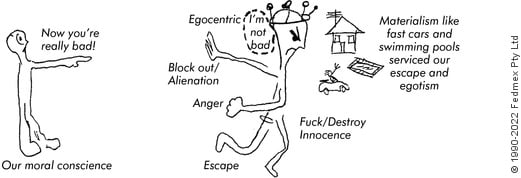‘FREEDOM’—Chapter 8 The Greatest, Most Heroic Story Ever Told
Chapter 8:11A Adventurous Adolescentman
The species: Homo erectus — 1.9 to 0.1 million years ago
The individual now: 21 to 30 years old
The Adventurous Early Adulthood Stage (of Humanity’s Adolescence) is the time we took up the battle to overthrow our idealistic instinctive self or soul’s ignorance as to the fact of our conscious self’s fundamental goodness.
In the journey of the resigned individual, by 21 years of age, after about six years of blocking out the negatives and focusing only on the tiny positives available to them, they each finally adjusted to life in resignation. In fact, by 21 both resigned and unresigned young adults were able to arm themselves sufficiently well with a positive attitude to commit themselves to the battle that humanity as a whole was involved in of gradually, step by step, generation by generation, working towards one day accumulating sufficient knowledge to be able to explain and liberate the human race from the human condition. Indeed, by 21, resigned men in particular had become so focused on the positive of the adventure of attempting to make a good fight of the battle to validate themselves through winning power, fame, fortune and glory that they were cavalier and swashbuckling and raring to go. In the case of the unresigned, they were also boldly and defiantly believing they could, if not change, then at least contain all the corrupt behaviour that was occurring. Naive about just how quickly overwhelming the battle was going to become, both resigned and unresigned males had plenty of strength and resilience—plenty of ‘rock-n-roll’. For their part, both resigned and unresigned 21-year-old women had also become firmly focused on the few positives they had of the reinforcements they could receive from men for their physical, youthful beauty and of the satisfaction of being able to support men and nurture another generation of brave humans to carry on humanity’s heroic struggle. (The different roles of men and women will be described more fully shortly.) Hence the significance of the long-held tradition in Western societies to hold a ‘coming of age’ party for offspring when they reached this milestone, at which they were typically given a ‘key’ symbolising that they were at last ready to leave home and ‘face the world’, and so with a big kiss from Mum and a slap on the back from Dad the young adult set off ‘to see what life held for them’. Interestingly, the fact that young adults were considered sufficiently adapted to life under the duress of the human condition to be considered independent at 21 rather than at the round figure of 20 is an indication of how precisely all these stages with ages occurred, and also how uniform and powerful the effects of the human condition have been.
So it was essentially during our 20s in the lives of humans today where Resignation is almost universal, or in the case of humanity during its adventurous 20s-equivalent adolescence where everyone was unresigned, that all the techniques needed to cope with living with the horror of the human condition began to be refined. In our teens we agonisingly adjusted to having accepted a life of living with upset, but it was in our 20s that we took up the challenge of living out that life. Our forebear who lived in humanity’s adventurous 20s-equivalent early adulthood stage was ‘Adventurous Adolescentman’, Homo erectus, who existed between 1.9 million and 0.1 million years ago. Consistent with the description that has been given for this stage, fossil evidence has revealed that it was H. erectus who first adventured out from our ancestral home in Africa around 1.9 million years ago and initiated the spread of humans throughout the world.
While the many methods for coping with the human condition that were perfected during the over 1-million-year reign of ‘Adventurous Adolescentman’ have been part of human life for so long now we tend to think of them as having always been part of our species’ make-up, as part of our ‘human nature’, the fact of the matter is they all had to be invented. Yes, in truth, our behaviour underwent an immense transition—especially amongst those who became resigned and changed from living cooperatively, selflessly and lovingly, to living extremely competitively, selfishly and aggressively.



